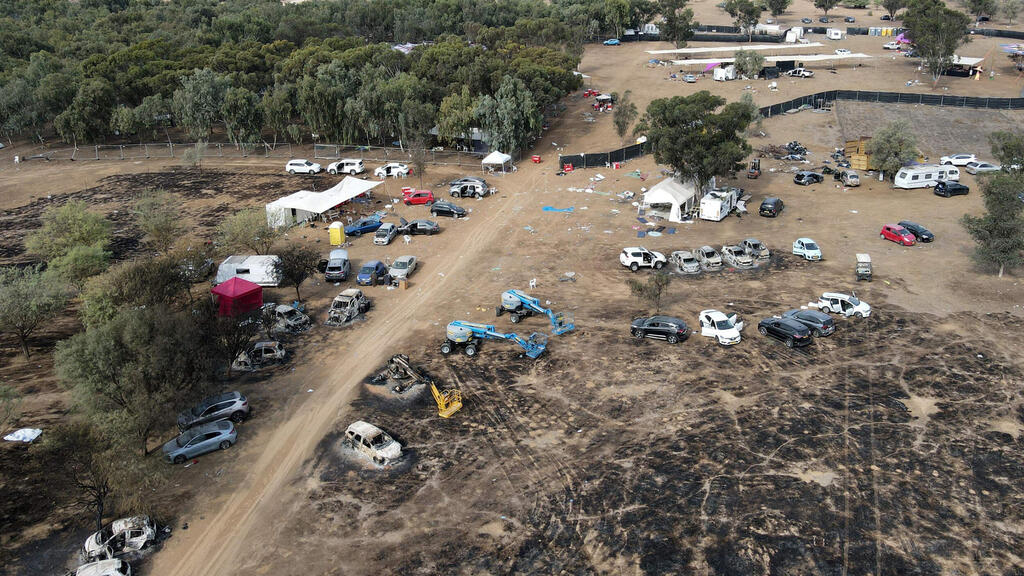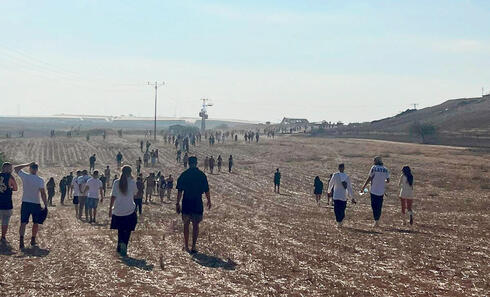
ISRAEL AT WAR
Hard facts vs fake news: Filtering the truth in the war with Gaza
The fastest information regarding what is happening in the Gaza Strip was provided by the social networks over the weekend, but at the same time, a malicious fake news industry flourished
The warning in the apartment building's WhatsApp group was frightening. "The tenants have received all kinds of messages that police vehicles have been stolen, please do not open your doors," the head of the resident's group wrote. One of the neighbors, a police volunteer, hastened to reassure everyone: "It's a fake message! I just came back from a ten-hour shift, it's not true." Apparently it wasn't convincing enough. "Really? Because the story has been shared everywhere since the morning," responded one of the neighbors. The head of the resident's group then added: "Let's be careful and pay attention to everything that is said."
This exchange succinctly summarizes the forces behind the massive spread of fake news, especially in times of crisis like now: if it's viral, it's probably true, and even if it's not, it's worth spreading because maybe it's true after all.
But the reality is the opposite: widespread circulation is not a guarantee of the truth, but only of the degrees of emotions it arouses, and the distribution of uncontrolled information is not a precaution but rather a danger, since it can create an overload of information that ultimately prevents the distribution and reception of true information.
Fake news, hate mongering and delusional conspiracy theories have become an integral part of our lives in the last decade, and they intensify especially in moments of crisis. The current war has, of course, brought with it its fake news and conspiracies, and this time they are more dangerous than ever. Over recent days a conspiracy theory has been spread that accuses no less than the IDF soldiers themselves of treason. If you thought that X (Twitter), a central arm in spreading the conspiracy, would come to the rescue, don't hold your breath, as Elon Musk himself helped expand the distribution of fake news and incitement against Israel, by engaging tweeters who specialize in exactly that.
Since the beginning of the horrendous attacks, social networks - especially Facebook, WhatsApp and X - have become the main means of transmitting current, broad and detailed information about what is happening on the ground and for activating impromptu support and assistance systems.
At a time when the Prime Minister and the ministers and senior officials are largely silent, or publish generic recorded messages, and when the media are only able to provide partial information, it was social media users who updated, directly or through acquaintances, about what was happening in the settlements surrounding Gaza, raised requests for assistance in locating missing persons and promoted initiatives for rescue and assistance. In the first hours of the war, only through these platforms was it possible to get an almost complete picture of what was happening.
But alongside the real information that flowed from the field, the networks, especially WhatsApp, were flooded with fake news, some of it dangerous. The sources of the false information are unknown, and some will not be discovered either. But it is quite clear that some of it was coming from those who work in the service or on behalf of Iran and Russia - known polluters of the online discourse in Israel, who spread fake news as a strategy to intensify division and fragmentation in Israeli society.
Alongside them, it can be assumed, are also private users who act out of anti-Israeli ideological motives or simply out of a childish desire to sow confusion and panic. Sometimes, fake news starts as a joke that was not understood as such by users, who rush to spread it further as if it were true.
It doesn't start with a bot
As for distributors, in the estimation of Revital Salomon, founder and CEO of The Shark Lady and an independent researcher of the fake news discourse and incitement in social media, these are divided into three main types. "First, you have the type who wants attention and to feel like they are the center of the world," she says. These distributors are looking for the sensation that will bring them the likes and shares, they are addicted to the hit of dopamine that their brain releases when the number of likes reaches a critical mass.
The second type, according to Salomon, are those who "forward without filtering, without thinking". Like the head of that apartment building residents group, who thinks the prudent thing is to forward everything. And finally, there are users with low digital literacy, who fail to differentiate between fake news and reliable information, and are sure that they are conveying important information that their circle of acquaintances needs to know.
The identification of fake news is not complex. First, we need to start with a healthy dose of skepticism and apply it to any news that comes our way. As a general rule, always doubt information unless it comes with a link to a reliable news source (which includes most of the mainstream media in Israel); or first-hand information from a user ("happened to me", as opposed to "I heard from a cousin's friend") whom we know well.
Beyond that, there are several other signs that can help identify fake news: a WhatsApp message with the inscription "Forwarded many times" is automatically attached by the application to messages forwarded to a large number of users, and is an indication of potentially false information. The same goes for news stories that open with exciting statements like "you won't hear about this in the media", or alternatively "they just announced it on TV" (without attaching a video or a link to the report).
In general, sensational and emotional information is also an indication of fake news, however in the current saga, which is entirely interspersed with emotional and sensational stories, this is not a reliable indicator.
Along with fake news and the presentation of false information as truth, recent events also bring with them disgusting or dangerous conspiracy theories. The most horrifying of all is the one that gained momentum during Sunday, according to which the terror attacks was the result of the work of traitors in the service of the Israeli security forces. Although it is easy to believe that inciting and dangerous statements like these originate from accounts operated by foreign sources, Salomon estimates that their creator is actually local. "Yes, there are Iranian bots, but the heart of the poisonous machine is Israeli," she wrote on X. "It doesn't start with bots. It starts with popular media personas, then the young propagandists, and then sponsored fakes, which have been planted here for years. Then there are the fakes and half-fakes and also small and random profiles with just 30 followers."
In this case, the false narrative seems to have erupted from the bottom of the pile, from anonymous and relatively small accounts, and then trickled up to users with a more significant circulation. "Some get money, some don't. Some want a position of power," says Salomon. "Some want a job in the Likud party or to run for politics. Some just want validation and likes. Some just enjoy cursing. These are not Russians or Iranians. These are Israeli citizens, directed from above and on personal initiative, who worship Netanyahu and will do anything to spread his incitement, including defaming. These are the people who spread the lie of treason. They will spread any lie they are told to spread. They do it consciously, fully aware and knowingly."
Later on, the narrative was seen and distributed by second-tier media personas and celebrities, such as the sports channel commentator and former soccer player Maor Buzaglo or a presenter on Galei-Israel radio, who wrote about "spies from the inside" before deleting the post. After that, the narrative, in a more refined and implicit form, also reached the main stage courtesy of the propagandist Yaakov Bardugo who spoke on Channel 14, which supports Netanyahu, about the "Eisenkots and Gantzians" who are not thinking about Israel but "about how to establish their narrative" according to which Netanyahu is to blame for the failure.
The question of how to deal with this conspiracy theory has been written about by quite a few. There were those who proposed to take action against its distributors on the criminal level, and mentioned Section 103 of the Penal Code, which states: "Whoever disseminated during combat, and with the intention of causing panic in the public, news that has the potential to undermine the spirit of Israel's soldiers and its residents in facing the enemy, shall be punished - Five years in prison; and if they intended to harm the security of the state, their sentence is ten years in prison."
However, legal sources familiar with the attitude of the State Attorney's Office to this section say that it is considered an archaic offense, and that the preferred way to deal with this type of issue is through public pressure. And there was indeed such pressure.
The Fake Reporter organization, freelance journalist Saul Greenfeld, the Shomrim media organization, and others, compiled the names of the users who advanced this conspiracy theory in an act of justified shaming. In the case of Buzaglo, there was also a widespread call for his immediate dismissal from the sports channel.
Related articles:
Musk stokes the fire
Aggravating this situation is Elon Musk, who as the owner of X (Twitter) can take significant efforts to clean fake news and incitement from his platform, but it seems that he chooses to do the opposite. On Sunday, Musk recommended to his 150 million followers on X to follow the war in real time through two accounts. The first account wrote about a year ago that "the vast majority of people in the media and banks are Zionists", and in June he wrote to a person he was arguing with "Go worship a Jew". Emerson Brooking, a researcher at the independent research institute Atlantic Council defined the second account as "a completely toxic account, which regularly publishes incorrect and unverified information".
Musk did delete the post after about three hours, but only after it had already been viewed by 11 million users and had brought significant traffic.
And meanwhile, in Israel, the dysfunction of the Ministry of Information led by Galit Distel-Atbaryan has left the online arena without any coordinated or significant information activity on behalf of the State of Israel. As a result, the leaders of the protest against the judicial reform, those who have been described by government officials for months as anarchists, are forced to take the lead in this sector as well, as they have done in many other sectors. One of them is Prof. Shikma Bressler from the leadership of the protest against the judicial reform that is coordinating the establishment of a team that will consist of creative people, video editors, graphic designers, photographers, social media experts and translators, that will work to shape and spread the Israeli narrative in Israel and abroad.
